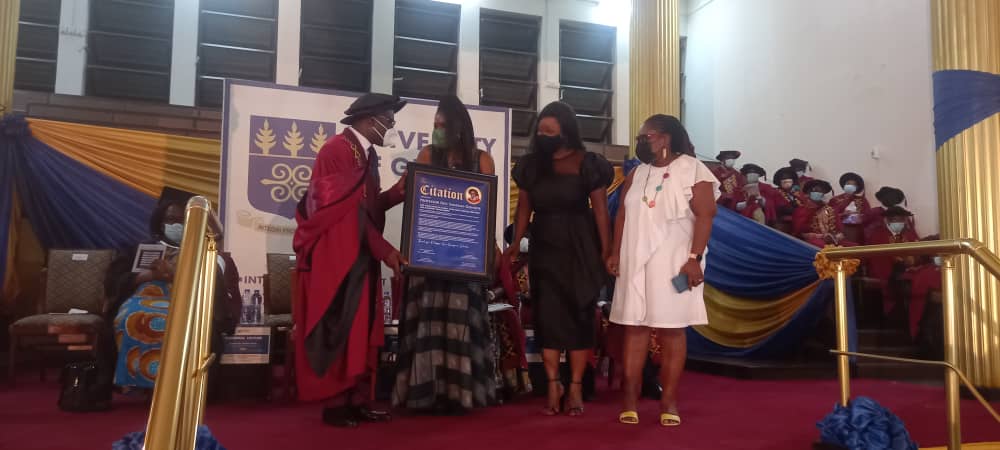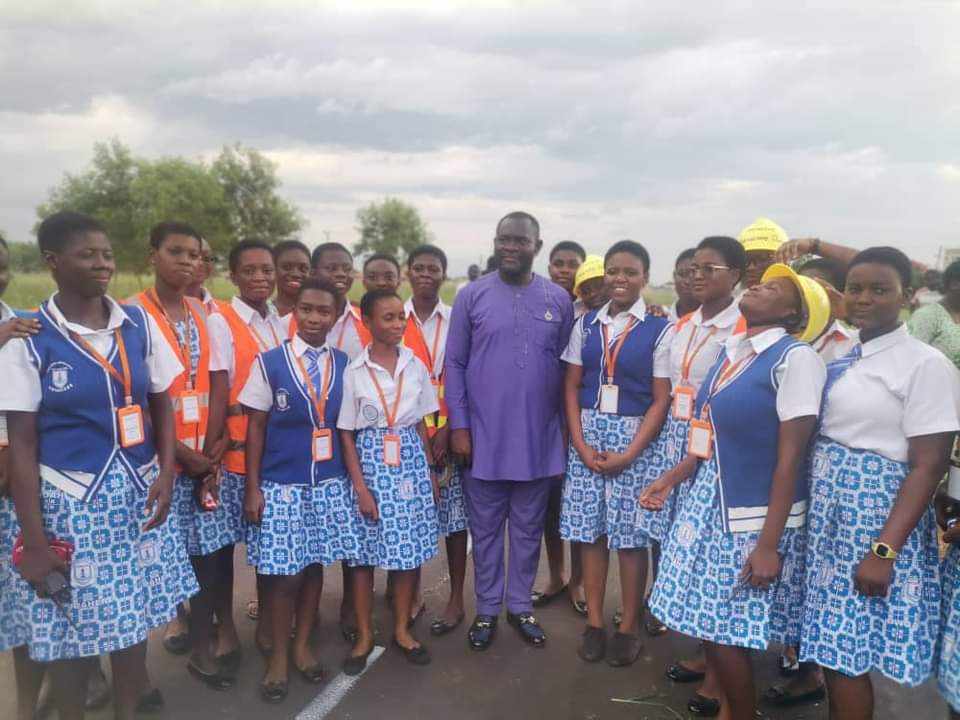GAG Honours Prof. Eric Sampane-Donkor For His Contributions To Global Infectious Disease Research

The Ghana Advocacy Group (GAG), a think tank with the objective of conducting research and advocacy on issues in Ghana relating to socio-economic, socio-political policy, health, technology, and cultural understanding, has honoured Professor Eric Sampane-Donkor, Head, Department of Medical Microbiology, University of Ghana Medical School for his works and achievements in the medical field.
GAG is a diaspora led platform of Ghanaian professionals, diplomats, and academics from a wide range of backgrounds, living in Ghana as well as the diaspora building foremost platforms which provides an avenue for Ghanaians in the diaspora to engage on different issues of development, leveraging their skills, network and resources to provide constructive solutions to challenges confronting the people.
At the Inaugural Lecture delivered by Prof. Eric Sampane-Donkor at the Great Hall of the University of Ghana on Thursday, February 10, 2022, members of GAG presented a citation and other items to Prof. Eric Sampane-Donkor for his outstanding contribution to medical science.
 Prof. Eric Sampane-Donkor’s works apply concepts from several fields to help address the global infectious disease challenge through research. His current research interests focus on understanding the dynamics of infectious pathogens in at-risk populations, such as patients with stroke, sickle cell disease and diabetes and prospect of the development of new, more effective drugs for a range of deadly diseases.
Prof. Eric Sampane-Donkor’s works apply concepts from several fields to help address the global infectious disease challenge through research. His current research interests focus on understanding the dynamics of infectious pathogens in at-risk populations, such as patients with stroke, sickle cell disease and diabetes and prospect of the development of new, more effective drugs for a range of deadly diseases.
A member of the Ghana Advocacy Group (GAG) who led some members of the Group to the event to present the honours to Professor Eric Sampane-Donkor on behalf of their President, Kwame Boakye Danquah (Toziah Kbd), Awo Tsumasi told the media in an interview that GAG is a Non-Governmental Organization consisting of like-minded Ghanaians both living in abroad and in Ghana who want to see Ghana do better.
Awo Tsumasi further explained that GAG is a think tank with the objective of conducting research and advocacy on issues in Ghana relating to socio-economic, socio-political policy, health, technology, and cultural understanding.
“We are here today to support one of our members, Prof. Eric Sampane-Donkor for his remarkable achievements. And we are just proud of him for what he is doing for Global infectious disease research and work.
Congratulations to him,” she said.
She also explained that Prof. Eric Sampane-Donkor studied abroad and worked in the US and other parts of the world, and as a member of the Group, he is back in Ghana and making a real impact on the healthcare delivery system of the country.
Awo Tsumasi said; “He is making sure that we have the Pneumococcal vaccines on the list of immunizations is no easy thing, congratulations to him.
In a telephone interview with the President of GAG, Kwame Boakye Danquah (Toziah Kbd) who spoke from the USA, he indicated that the formation of GAG was born out of necessity and the quest to help Ghanaians both home and abroad.
He also congratulated Prof. Eric Sampane-Donkor for his sterling achievements and mentioned that his contributions to the Global infectious disease research have been phenomenal.
The Lecture
Prof. Eric Sampane-Donkor during his Innaugural Lecture on the Topic; “The 130 Year War Between Man And Pneumococcus; Who Is Winning?, explained that pneumococcus, was first isolated in 1881 and recognized as one of the most infectious microbial pathogens, recording case fatality rates of up to 66%.
Globally, he stressed, there are about 14.5 million episodes of serious pneumococcal disease among children less than 5 years of age each year, resulting in approximately 500,000 deaths, the majority of which occur in low- and middle-income countries.
He also averred that the public health burden related to pneumococcus is further heightened by the increasing resistance of the organism to essential antimicrobial agents particularly penicillin, cephalosporins and macrolides.
“The enormous public health burden associated with S. pneumoniae underscores the importance of its control through vaccination. At present, two types of pneumococcal vaccines are available: conjugate vaccines and the pure polysaccharide vaccine (unconjugated)…Most of these limitations have been overcome by the relatively new conjugate vaccines, in which purified capsular polysaccharides are conjugated to a nontoxic variant of the diphtheria toxin.”
Current pneumococcal conjugate vaccines (PCVs), he said consist of 10 or 13 capsular types and have been introduced into the immunization programme of about 146 countries.
Following the introduction of PCVs, there has been a dramatic decline in pneumococcal infections in vaccinated children and a herd immunity effect in other age groups.
However, this success has been tempered by serotype replacement for ongoing invasive pneumococcal disease.
Professor Eric Sampane-Donkor thus provided an in-depth review of pneumococcus, delivering insights into the biology and pathogenicity of the organism.
Speaking in an exclusive interview after the lecture, Professor Eric Sampane-Donkor said research into Pneumococcus had informed the introduction of PCV 13 Vaccines in Ghana but there is the need for further research to find out if there are new strains emerging so as to find suitable vaccines to fight it.
According to him, Pneumococcus kills 500,000 children every year and 60 out of every 100 children who have Pneumococcus will not see their 5th birthday, that he said “is the danger of Pneumococcus.”
He also mentioned that the current vaccines are not perfect vaccines; hence there is the need for research into the discovery of potent vaccines.
Professor Eric Sampane-Donkor also called for surveillance, stressing that “The war is ongoing; the pace of the war is being dictated by Pneumococcus and if more is not done to get potent/perfect vaccines to fight it, I am afraid the war will turn in favour of the Pneumococcus.
By PROSPER AGBENYEGA




